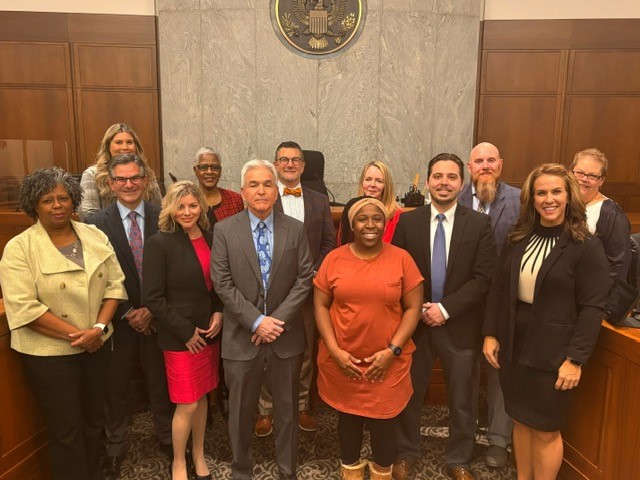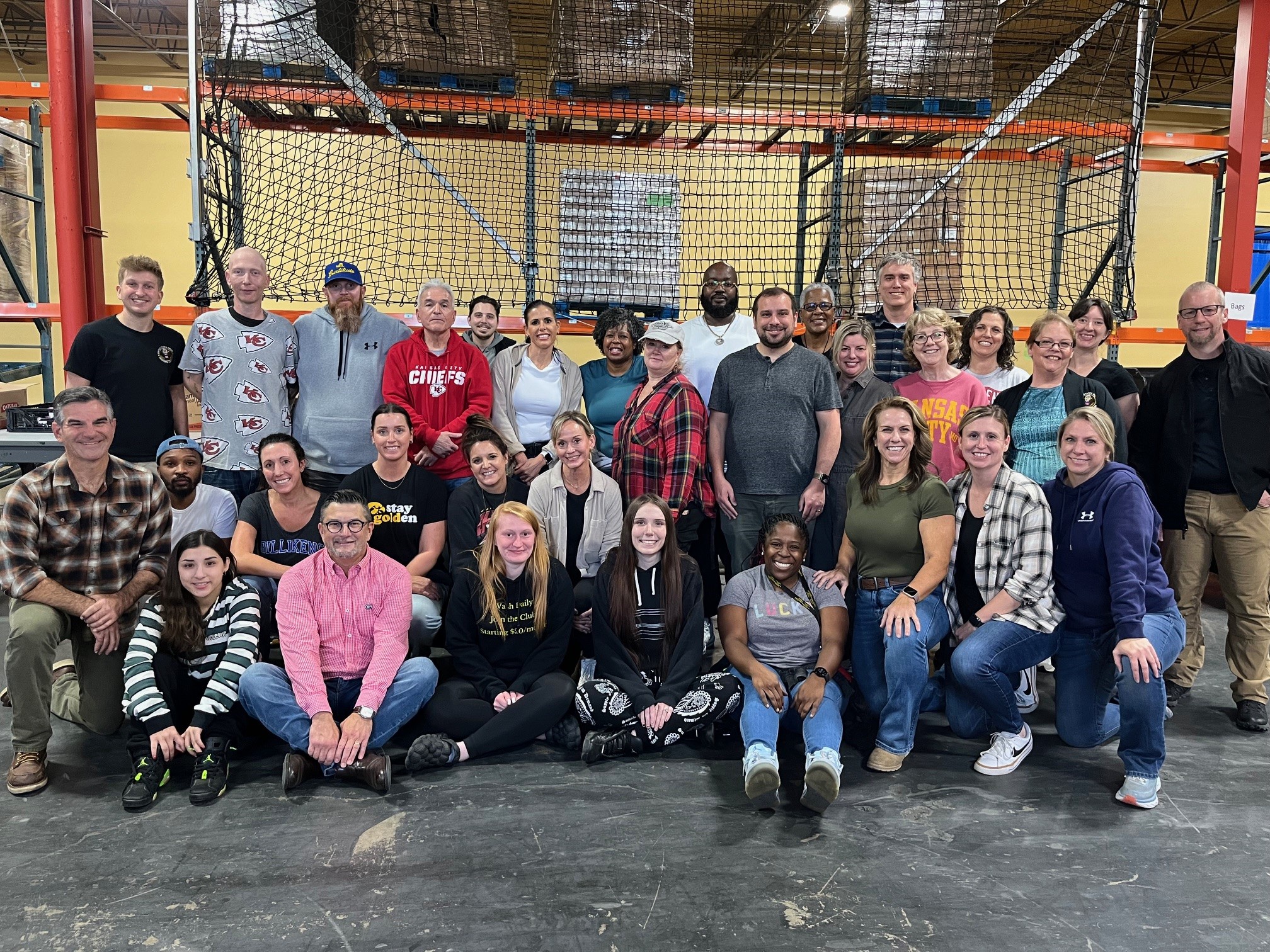The Western District of Missouri is proud to continue a strong tradition of alternative courts working to achieve justice. Our first alternative court, Re-entry Court, was started in 2010. Re-entry Court was a backside specialty program focused on helping individuals returning from the Bureau of Prisons succeed in their communities. In 2017, Intensive Drug Treatment Court (IDTC) was added as an additional program. IDTC was a frontside program that provided intensive supervision to individuals who pled guilty to criminal conduct that was motivated by a drug addiction. Graduation from IDTC meant that the participant received a sentence of probation. In 2023, Re-entry Court was merged with IDTC to create the Intensive Treatment Court (ITC). ITC, like IDTC, is a frontside, post-guilty plea program. ITC provides sentencing alternatives to individuals whose criminal conduct appears to have been motivated by any underlying treatable concern, not just drug addiction.
While supervised by United States District Judge Beth Phillips, United States District Judge Stephen R. Bough, and United States Magistrate Judge Lajuana Counts, the program is a collaborative effort between the Court, the United States Probation and Pretrial Services Office, the United States Attorney’s Office, and the Federal Public Defender’s Office. Additionally, ITC extensively uses contracted counselors to address substance abuse or other traumas. Using the program’s guidelines for participation, the team selects participants after weighing the individual’s criminal background and their likelihood to respond to the program’s efforts. Together, the team strives to achieve the program’s desired goal: successful program graduates who can enjoy healthy, productive, and law-abiding lives.

The program lasts between twenty-four and thirty-six months, depending on the participant’s rate of success in each of the program’s five phases. Each phase is designed to allow the participant to gain the skills and tools necessary to succeed in the community. These phases also reflect the incremental process of recovery and focusing on early recovery, making positive changes, relapse prevention, maintenance, and finally, graduation from the program once the participant can live a sober, safe, and happy life.
General Information, History, and Statistics
The U.S. Probation office screens all new case filings for individuals eligible to participate in the ITC program. Other courts have an application process, but we have found that screening all individuals allows a fairer process. Once eligibility is determined, any member of the ITC team may disqualify a defendant. The two factors that result in approximately sixty percent of all disqualifications are the number of prior criminal convictions or an individual’s current charges (such as crimes of violence, sex offense charges, or a risk level deemed too high for the ITC program). The remaining reasons for disqualification can include active Immigration and Customs Enforcement (ICE) detainers, a writ extending over six months, low criminogenic and treatment needs, or a residence outside the catchment area for the program.
Cost Savings to Taxpayers
In 2020, American taxpayers spent $39,158 per inmate, per year, for individuals incarcerated in federal prisons. Individuals on supervised release cost taxpayers roughly 1/8th the cost of incarceration. Given that all participants in ITC must be employed and paying taxes, the program offers great economic benefit to taxpayers. Additionally, graduates of ITC have a lower recidivism rate compared to individuals who do not complete the program. The United States Sentencing Commission found the recidivism rate for federal offenders to be approximately 50%. The Re-entry Court recidivism rate was 14% and IDTC/ITC has a 30% recidivism rate.
The average ITC participant is at the bottom of a larger drug conspiracy. In federal court, judges are required to properly calculate the sentencing guidelines as promulgated by the United States Sentencing Commission. Judges then can choose to follow the advisory guidelines, sentence above the guidelines, or sentence below, all based upon a host of factors set forth by Congress. The sentencing guidelines are heavily influenced by the quantity of drugs in a conspiracy and whether there were any firearms involved in the crime. Of the eleven ITC graduates, the average guideline range was 97 – 119 months of incarceration. Of the current participants, the average guideline is 94 - 113 months. Keeping in mind the costs of incarceration, our ITC graduates have saved taxpayers between $3,000,000 and $4,000,000.
From 2017 to 2024 a total of twenty-eight individuals have been admitted to IDTC or ITC. Given limits on funding and staffing, the program is currently limited to twenty-one participants. The chart below is a breakdown of seventeen individuals who have completed the ITC program. The one voluntary withdrawal was an individual who pled guilty to Conspiracy to Commit Wire Fraud and did not have a condition that we could address with counseling. The five discharged defendants, who had already pled guilty, were sentenced by a district judge. The eleven graduates all received three to four years of probation upon completion of ITC.

ITC Process for Participants
Once selected for ITC, participants meet with their defense counsel to review and sign an extensive agreement setting forth all requirements of the program. At the change of plea hearing the District Judge directly addresses the ITC agreement, the hard work required to succeed, and the very core requirement of honesty. From there, the participant is admitted to the five-phase program. After the judge accepts the plea and all parties sign the agreement, a new participant is admitted to the program and starts attending the bi-monthly ITC sessions.

The early ITC phases have stricter requirements with smaller steps to accomplish, such as obtaining a job and consistent counseling. As a participant moves through the program, the steps become larger, with incentives (usually gift cards to restaurants or shopping) and encouragement tailored to continued success. Community service with ITC participants and partners in the program is vital to our success. With each advancement through the five phases, the requirements to attend counseling or treatment court meetings are required less and less.
Interested in your own ITC?
Other Courts interested in learning about this program should contact Officer Katie Meister at (816) 719-1106. The United States Sentencing Commission has collected a wealth of information regarding other problem-solving courts. The Federal Judicial Center also provides coaching to assist in specialized dockets. The Western District of Missouri will also welcome other courts to watch an ITC session via Zoom.
The Court thanks Mr. Michael Rose, UMKC Law Student and judicial intern, and Ms. Helen Morris, law clerk, for their assistance in collecting this information and creating the content.
